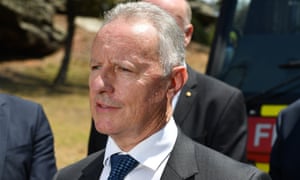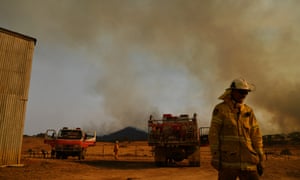I just returned from another round of fighting fires. It was
devastating to see the outcome of appalling leadership from Canberra
Not long ago, somebody said to me, “It would take a huge disaster for
this government to acknowledge that there is such a thing as climate
change.” Tragic, but perhaps true.
While we now seem to have grudging government acknowledgment that climate change is the predominant driver of the current bushfire disaster (notwithstanding it previously being portrayed as “not a factor”, “one of many factors” or a delusion of inner-city latte-sipping greenies, etc), the acknowledgment has yet to be matched by action on the root cause.
Make no mistake: this disaster is a weather-driven event, not a fuel-driven one, underpinned by years of drying and warming. Climate change is the driver of increasing extreme weather.
I recently returned home from another three days of fighting fires as
an Rural Fire Service volunteer. I’ve lost count of the deployments:
Grafton, Wollombi, Spencer, Howes Valley, Bargo, Blackheath, Batemans
Bay, Wombeyan Caves, and others. Like countless other men and women on
the front line I have faced off against 30-metre walls of flame, seen
many homes burned to the ground, tried to console inconsolable
residents, been forced to run for safety and seen native animals
bounding out of the burning bush to collapse and die. Devastating.While we now seem to have grudging government acknowledgment that climate change is the predominant driver of the current bushfire disaster (notwithstanding it previously being portrayed as “not a factor”, “one of many factors” or a delusion of inner-city latte-sipping greenies, etc), the acknowledgment has yet to be matched by action on the root cause.
Make no mistake: this disaster is a weather-driven event, not a fuel-driven one, underpinned by years of drying and warming. Climate change is the driver of increasing extreme weather.
Particularly devastating because together with 22 former fire and emergency service chiefs from every state and territory I had tried from April 2019 to warn the prime minister about what veteran firefighters, climate scientists and meteorologists all identified as a looming bushfire disaster. We were ignored and trivialised: the government inferred that we were criticising the efforts of current fire chiefs and told us via the media that we could be assured that the “new breed” of chiefs “had it under control”. Of course, this missed the point entirely. We were trying to say things that the existing hard-pressed, hard-working chiefs could not. Our suggestions about better using the military and freeing up processes to allow them to be used in non-firefighting support roles, our request for approval of additional funding for large firefighting aircraft, and better national coordination (following the hollowing out of Emergency Management Australia, which has now been absorbed into the huge Home Affairs bureaucracy) were ridiculed. Until, of course, the disaster worsened, and the media and public called for action. Then the government “took the initiative”.
"Continuing to burn coal, oil and gas is sending us down a pathway to an even hotter, drier Australia where conditions will get worse"
There has been an appalling failure in national leadership from Canberra. Failure to recognise and prepare for what was coming. Failure to accept briefings from experts. Failure to understand and accept the government’s national support role to the states and territories. Failure to provide funding certainty for critical equipment requested by fire agencies in a detailed business case but stalled in Canberra since May 2018.
And the government is failing again by now suggesting that our primary focus should be on adapting to climate change rather than upping our efforts to tackle the root cause: the burning of fossil fuels. Continuing to burn coal, oil and gas is sending us down a pathway to an even hotter, drier Australia where conditions will get worse and worse.
Widespread rain in New South Wales is helping, but months of hot weather could still lie ahead. NSW has lost approximately 10 times more homes than in its previous worst fire year, 1994, and burned five times more country than it did in that year. We are yet to enter the worst fire danger period for Victoria, Tasmania and South Australia, yet they have already been burning. Things could still worsen.

Australia MUST take urgent action on emissions and stop the lies about the current ineffective response to our climate emergency. I fear for future generations and I wish that as Australians we could again act with moral authority on this global issue, as we did on issues such as nuclear disarmament, apartheid and gun control. But the first step to be able to do this is to establish Australia as a leader in climate action. It is hard to take suggestions of a royal commission seriously. Might this simply be another way to stifle debate and take attention away from inaction on emissions?
The states and territories will hold operational reviews: the best thing our national government can do is to look hard at the hundreds of unfunded recommendations from previous bushfire inquiries and set about listening to the more moderate, intelligent voices in its ranks from people who understand that the time for decisive, real climate action is right now.
• Greg Mullins is a former commissioner of Fire and Rescue NSW and a climate councillor

No comments:
Post a Comment